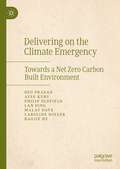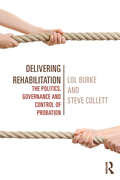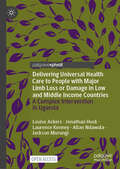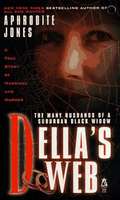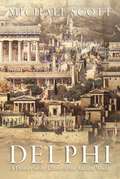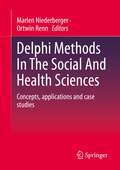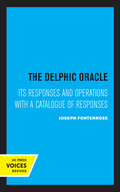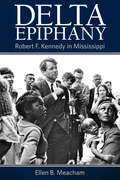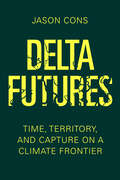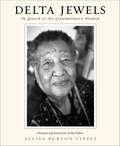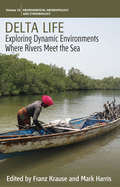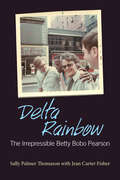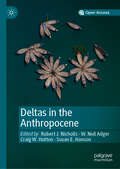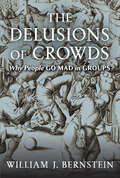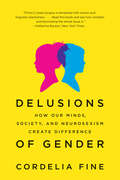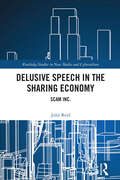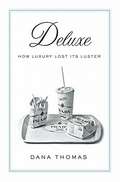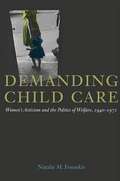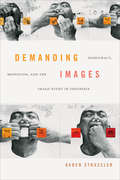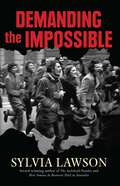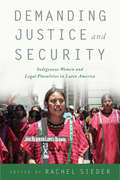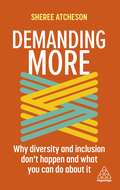- Table View
- List View
Delivering on the Climate Emergency: Towards a Net Zero Carbon Built Environment
by Deo Prasad Aysu Kuru Philip Oldfield Lan Ding Malay Dave Caroline Noller Baojie HeThis book focuses on the transition towards net-zero carbon built environments to deliver on the climate emergency. It provides an evidence-based roadmap and proposes guidelines to achieving targets covering emerging technologies, materials, innovative design, regulations and policies.
Delivering Police Services Effectively (Advances in Police Theory and Practice #27)
by Garth den HeyerThis book addresses the various strategies that are available to police management, such as consolidation, regionalization, and amalgamation of police agencies; new public management (NPM); enhanced performance management; civilianization; and organizational restructuring. It fills the gap in the research as to how police agencies have reacted to the environmental and fiscal changes since the 1980s. The book examines the strategies employed and the effect on police and their delivery of service.
Delivering Rehabilitation: The politics, governance and control of probation
by Lol Burke Steve CollettDo offenders have the right to be rehabilitated and should the state be responsible for their rehabilitation? Should the public expect punitive and coercive approaches to offender rehabilitation? Why should the state be interested in the reform of individuals and how can helping offenders be justified when there are other disadvantaged groups in society who are unable to access the services they desperately need? Finally, why does the state appear to target and criminalise certain groups and individuals and not others? These are just some of the questions asked in this new text, which offers an analysis of the delivery of rehabilitative services to offenders over the past two decades. It focuses particularly on the ideological and political imperatives of a neoliberal state that intends to segment the work of the Probation Service and hand over the majority of its work to the private sector. Issues covered include: governance, politics and performance of probation, occupational culture and professional identity, markets, profit and delivery, partnership, localism and civil society, citizenship, exclusion and the State. This book is aimed at academics, practitioners, managers and leaders within the field of corrections and wider social policy. It will also appeal to undergraduates and postgraduates specialising in criminal justice, criminology, politics and social policy.
Delivering Universal Health Care to People with Major Limb Loss or Damage in Low and Middle Income Countries: A Complex Intervention in Uganda
by Louise Ackers Jonathan Huck Laurence Kenney Allan Ndawula Jackson MurungiThis Open Access book addresses the need for rehabilitation services for people impacted by Major Limb Loss in Low and Middle Income Countries. It focuses on a Complex Intervention study in Uganda supporting the provision of affordable and accessible prosthetic services in a public referral hospital. The book demonstrates the impact that overwhelming dependency on overseas support has had on service development and the delivery of universal health coverage and provides an evidence base to support a change in the contribution that overseas assistance makes to health systems planning.
Della Medicina: The Tradition of Italian-American Folk Healing
by Lisa Fazio• Details the healing techniques and folk wisdom the author learned from her Italian grandparents and from healers in Southern Italy, including plant preparation methods, medicines, rituals, recipes, kitchen magic, and protective magic• Provides a materia medica of plants important in this tradition, sharing each plant&’s history, mythology, and both practical and magical uses• Reveals how working with traditional plant medicines can help us connect to and revitalize our own ancestral traditions for deep inner healingBuilding upon the in-depth folk wisdom she learned from her immigrant grandparents as well as from local healers in Southern Italy, second-generation Italian-American and experienced herbalist Lisa Fazio shares herbal traditions and practices from the Italian diaspora and reveals how working with traditional plant medicines can help us connect to ancestral traditions for deep inner healing.She explains how the herbal healing practices of her Italian ancestors were simply a part of everyday life, what they called Benedicaria, which literally means &“the Blessing Way&” but is more often translated as &“the things we do.&” Examining how plants are not only food and medicine but a vital yet invisible part of traditional communities, she details the techniques of Benedicaria, folk Catholicism, and the animistic traditions of her ancestors, including plant dialects, preparation methods, rituals, and recipes, as well as provides a materia medica. Discussing the relationship between Italian folk medicine and Italian witchcraft, she explores kitchen magic and protective magic, including practices for warding off the adverse effects of the evil eye.Sharing valuable and nearly forgotten teachings from the Southern Italian herbal tradition, the author also shows how her journey to reconnect with her family&’s healing practices offers guidance for anyone seeking to reconnect with their ancestors.
Della's Web: A True Story of Marriage and Murder
by Aphrodite JonesCincinnati heart surgeon Darryl Sutorious was spellbound, convinced he'd found the perfect wife. With bewitching hazel eyes and exquisite clothes, Dante Britteon seemed to have stepped straight out of Vogue and into his arms. But their honeymoon didn't last long. Beneath Dante's china-doll facade lured a dangerous woman, a man-hater born as Della Faye Hall, whose four previous marriages had been spiced with butcher knives, pistols, vandalized houses and lover set on fire, according to the men she ensnared. And by the time Darryl, haunted by his own impotence, summoned the strength to demand out of the marriage, Della Faye was only too happy to oblige: with a bullet to the brain. In this stunning book, New York Times bestselling author Aphrodite Jones traces the intricate web of this fiendishly calculating sexual con artist. From Della Faye Hall's strange childhood to her violent marriages, from the police investigation to the murder trial, this is the shocking story of a suburban femme fatale, a gold-digger driven by jealousy and greed to torture her husband to death.
Delphi: A History of the Center of the Ancient World
by Michael ScottA comprehensive narrative history of the ancient world's center, from its founding to its modern rediscoveryThe oracle and sanctuary of the Greek god Apollo at Delphi were known as the "omphalos"—the "center" or "navel"—of the ancient world for more than 1,000 years. Individuals, city leaders, and kings came from all over the Mediterranean and beyond to consult Delphi's oracular priestess; to set up monuments to the gods; and to take part in competitions.In this richly illustrated account, Michael Scott covers the history and nature of Delphi, from the literary and archaeological evidence surrounding the site, to its rise as a center of worship, to the constant appeal of the oracle despite her cryptic prophecies. He describes how Delphi became a contested sacred site for Greeks and Romans and a storehouse for the treasures of rival city-states and foreign kings. He also examines the eventual decline of the site and how its meaning and importance have continued to be reshaped.A unique window into the center of the ancient world, Delphi will appeal to general readers, tourists, students, and specialists.
Delphi Methods In The Social And Health Sciences: Concepts, applications and case studies
by Marlen Niederberger Ortwin RennDelphi methods enable the systematic collection of expert judgments. They have proven to be particularly useful when a certain level of expertise and judgment is required to answer a research question. There are different variants of Delphi methods, such as the group Delphi or the real-time Delphi. The book presents current methodological developments and examples of application in the social and health sciences.The contents● Delphi methods: Concepts and variants - Epistemological discussion - Practical challenges - Delphi in the social and health sciences - Real-time Delphi - Delphi markets.● Application examples for Delphi methods - Qualification requirements, recommendations for action for further development and strategy development in the health care industry - Personnel retention and recruitment in occupational nursing - Group Delphi for obesity prevention- Safety and health competence at work - Delphi methods in health promotionThe editorsProf. Dr. Marlen Niederberger is professor for research methods in health promotion and prevention at the PH Schwäbisch Gmünd.Prof. Dr. Ortwin Renn is Scientific Director at the Institute for Advanced Sustainability Studies, Potsdam (IASS).This book is a translation of the original German 1st edition Delphi-Verfahren in den Sozial- und Gesundheitswissenschaften by Marlen Niederberger and Ortwin Renn, published by Springer Fachmedien Wiesbaden GmbH, part of Springer Nature in 2019. The translation was done with the help of artificial intelligence (machine translation by the service DeepL.com). A subsequent human revision was done primarily in terms of content, so that the book will read stylistically differently from a conventional translation. Springer Nature works continuously to further the development of tools for the production of books and on the related technologies to support the authors.
The Delphic Oracle: Its Responses and Operations with a Catalogue of Responses
by Joseph FontenroseThis title is part of UC Press's Voices Revived program, which commemorates University of California Press’s mission to seek out and cultivate the brightest minds and give them voice, reach, and impact. Drawing on a backlist dating to 1893, Voices Revived makes high-quality, peer-reviewed scholarship accessible once again using print-on-demand technology. This title was originally published in 1978.
Delta Epiphany: Robert F. Kennedy in Mississippi
by Ellen B. MeachamIn April 1967, a year before his run for president, Senator Robert F. Kennedy knelt in a crumbling shack in Mississippi trying to coax a response from a listless child. The toddler sat picking at dried rice and beans spilled over the dirt floor as Kennedy, former US attorney general and brother to a president, touched the boy's distended stomach and stroked his face and hair. After several minutes with little response, the senator walked out the back door, wiping away tears.In Delta Epiphany: Robert F. Kennedy in Mississippi, Ellen B. Meacham tells the story of Kennedy's visit to the Delta, while also examining the forces of history, economics, and politics that shaped the lives of the children he met in Mississippi in 1967 and the decades that followed. The book includes thirty-seven powerful photographs, a dozen published here for the first time. Kennedy's visit to the Mississippi Delta as part of a Senate subcommittee investigation of poverty programs lasted only a few hours, but Kennedy, the people he encountered, Mississippi, and the nation felt the impact of that journey for much longer. His visit and its aftermath crystallized many of the domestic issues that later moved Kennedy toward his candidacy for the presidency. Upon his return to Washington, Kennedy immediately began seeking ways to help the children he met on his visit; however, his efforts were frustrated by institutional obstacles and blocked by powerful men who were indifferent and, at times, hostile to the plight of poor black children.Sadly, we know what happened to Kennedy, but this book also introduces us to three of the children he met on his visit, including the baby on the floor, and finishes their stories. Kennedy talked about what he had seen in Mississippi for the remaining fourteen months of his life. His vision for America was shaped by the plight of the hungry children he encountered there.
Delta Futures: Time, Territory, and Capture on a Climate Frontier
by Jason ConsA free ebook version of this title is available through Luminos, University of California Press's Open Access publishing program. Visit www.luminosoa.org to learn more.Delta Futures explores the competing visions of the future that are crowding into the Bengal Delta's imperiled present and vying for control of its ecologically vulnerable terrain. In Bangladesh's southwest, development programs that imagine the delta as a security threat unfold on the same ground as initiatives that frame the delta as a conservation zone and as projects that see the delta's rivers and ports as engines for industrial growth. Jason Cons explores how these competing futures are being brought to life: how they are experienced, understood, and contested by those who live and work in the delta, and the often surprising entanglements they engender—between dredgers and embankments, tigers and tiger prawns, fishermen and forest bandits, and more. These future visions produce the delta as a "climate frontier," a zone where opportunity, expropriation, and risk in the present are increasingly framed in relation to disparate visions of the delta's climate-affected future.
Delta Jewels: In Search of My Grandmother's Wisdom
by Alysia Burton SteeleInspired by memories of her beloved grandmother, photographer and author Alysia Burton Steele -- picture editor on a Pulitzer Prize-winning team -- combines heart-wrenching narrative with poignant photographs of more than 50 female church elders in the Mississippi Delta. These ordinary women lived extraordinary lives under the harshest conditions of the Jim Crow era and during the courageous changes of the Civil Rights Movement. With the help of local pastors, Steele recorded these living witnesses to history and folk ways, and shares the significance of being a Black woman -- child, daughter, sister, wife, mother, and grandmother in Mississippi -- a Jewel of the Delta. From the stand Mrs. Tennie Self took for her marriage to be acknowledged in the phone book, to the life-threatening sacrifice required to vote for the first time, these 50 inspiring portraits are the faces of love and triumph that will teach readers faith and courage in difficult times.
Delta Life: Exploring Dynamic Environments where Rivers Meet the Sea (Environmental Anthropology and Ethnobiology #28)
by Franz Krause and Mark HarrisProposing a series of innovative steps towards better understanding human lives at the interstices of water and land, this volume includes eight ethnographies from deltas around the world. The book presents ‘delta life’ with intimate descriptions of the predicaments, imaginations and activities of delta inhabitants. Conceptually, the collection develops ‘delta life’ as a metaphor for approaching continual and intersecting sociocultural, economic and material transformations more widely. The book revolves around questions of hydrosociality, volatility, rhythms and scale. It thereby yields insights into people’s lives that conventional, hydrological approaches to deltas cannot provide.
Delta Rainbow: The Irrepressible Betty Bobo Pearson (Willie Morris Books in Memoir and Biography)
by Sally Palmer ThomasonBetty Bobo Pearson (b. 1922), a seventh-generation, plantation-born Mississippian, defied her cultural heritage—and caused great personal pain for her parents and herself—when she became an activist in the civil rights movement. Never fearing to break the mold in her search for the “best,” in her nineties she remains a strong, effective leader with a fun-loving, generous spirit. When Betty was eighteen months old, a train smashed into the car her mother was driving, killing Betty's beloved grandfather and severely injuring her grandmother. Thrown onto the engine's cow catcher, Betty lived and did not remember the accident. She did, however, grow up to fulfill her grandmother's prediction: “Betty, God reached down and plucked you from in front of that train because he has something very special he wants you to do with your life.” In 1943, twenty-one-year-old Betty, soon to graduate from the University of Mississippi, received a full-tuition scholarship to Columbia Graduate School in New York City. Ecstatic, she rushed home to tell her parents. “ABSOLUTELY NOT. There is no way I'll allow my daughter to live in Yankee Land,” her father replied. After fierce argument and much door slamming, Betty could not defy her father. But she had to show him she was her own person. Her nation was at war—so Betty joined the Marines. After the war, Betty married Bill Pearson and became mistress of Rainbow Plantation in the Delta. In 1955, she attended the Emmett Till trial (accompanied by her close friend and budding civil rights activist Florence Mars) and was shocked by the virulent degree of racism she witnessed there. Seeing her world in a new way, she became a courageous and dedicated supporter of the civil rights movement. Her activities severely fractured her close relationship with her parents. Yet, as a warm friend and bold, persuasive leader, Betty made an indelible mark in her church, in the Delta communities, in the lives of the people she employed, and in her beautiful garden at Rainbow.
Deltas in the Anthropocene
by Robert J. Nicholls W. Neil Adger Craig W. Hutton Susan E. HansonThe Anthropocene is the human-dominated modern era that has accelerated social, environmental and climate change across the world in the last few decades. This open access book examines the challenges the Anthropocene presents to the sustainable management of deltas, both the many threats as well as the opportunities. In the world’s deltas the Anthropocene is manifest in major land use change, the damming of rivers, the engineering of coasts and the growth of some of the world’s largest megacities; deltas are home to one in twelve of all people in the world. The book explores bio-physical and social dynamics and makes clear adaptation choices and trade-offs that underpin policy and governance processes, including visionary delta management plans. It details new analysis to illustrate these challenges, based on three significant and contrasting deltas: the Ganges-Brahmaputra-Meghna, Mahanadi and Volta. This multi-disciplinary, policy-orientated volume is strongly aligned to the United Nation’s Sustainable Development Goals as delta populations often experience extremes of poverty, gender and structural inequality, variable levels of health and well-being, while being vulnerable to extreme and systematic climate change.
The Delusions of Certainty
by Siri HustvedtPrizewinning novelist, feminist, and scholar Siri Hustvedt turns her brilliant and critical eye toward the metaphysical issues of neuropsychology in this lauded, standalone volume. Originally published in her collection A Woman Looking at Men Looking at Women, The Delusions of Certainty exposes how the age-old, unresolved mind-body problem has shaped - and often distorted and confused - contemporary thought in neuroscience, psychiatry, genetics, artificial intelligence, and evolutionary psychology.
The Delusions of Crowds: Why People Go Mad in Groups
by William J. BernsteinThis “disturbing yet fascinating” exploration of mass mania through the ages explains the biological and psychological roots of irrationality (Kirkus Reviews).From time immemorial, contagious narratives have spread through susceptible groups—with enormous, often disastrous, consequences. Inspired by Charles Mackay’s nineteenth-century classic Memoirs of Extraordinary Popular Delusions and the Madness of Crowds, neurologist and author William Bernstein examines mass delusion through the lens of current scientific research in The Delusions of Crowds.Bernstein tells the stories of dramatic religious and financial mania in western society over the last five hundred years—from the Anabaptist Madness of the 1530s to the dangerous End-Times beliefs that pervade today’s polarized America; and from the South Sea Bubble to the Enron scandal and dot com bubbles. Through Bernstein’s supple prose, the participants are as colorful as their “desire to improve one’s well-being in this life or the next.”Bernstein’s chronicles reveal the huge cost and alarming implications of mass mania. He observes that if we can absorb the history and biology of this all-too-human phenomenon, we can recognize it more readily in our own time, and avoid its frequently dire impact.
Delusions of Gender: How Our Minds, Society, and Neurosexism Create Difference
by Cordelia Fine"[Fine's] sharp tongue is tempered with humor. . . . Read this book and see how complex and fascinating the whole issue is."--The New York Times <P><P> It's the twenty-first century, and although we tried to rear unisex children--boys who play with dolls and girls who like trucks--we failed. Even though the glass ceiling is cracked, most women stay comfortably beneath it. And everywhere we hear about vitally important "hardwired" differences between male and female brains. The neuroscience that we read about in magazines, newspaper articles, books, and sometimes even scientific journals increasingly tells a tale of two brains, and the result is more often than not a validation of the status quo. Women, it seems, are just too intuitive for math; men too focused for housework. <P><P> Drawing on the latest research in neuroscience and psychology, Cordelia Fine debunks the myth of hardwired differences between men's and women's brains, unraveling the evidence behind such claims as men's brains aren't wired for empathy and women's brains aren't made to fix cars. She then goes one step further, offering a very different explanation of the dissimilarities between men's and women's behavior. Instead of a "male brain" and a "female brain," Fine gives us a glimpse of plastic, mutable minds that are continuously influenced by cultural assumptions about gender. <P><P> Passionately argued and unfailingly astute, Delusions of Gender provides us with a much-needed corrective to the belief that men's and women's brains are intrinsically different--a belief that, as Fine shows with insight and humor, all too often works to the detriment of ourselves and our society.
Delusive Speech in the Sharing Economy: Scam Inc. (Routledge Studies in New Media and Cyberculture)
by Julie ReidIn this examination of how the rise of online sharing economy platforms has facilitated online crime, this book shows how, while marketed as trustworthy peer-to-peer services, these platforms are highly vulnerable to misuse by scammers and are used for the dissemination of delusive speech.The analysis centres around the concept of delusive speech, a sub-set of disinformation, designed to deceive and motivate by criminal intent. Looking beyond the economic and disruptive impacts of sharing economy platforms like Uber, Airbnb, and others, this book situates these Big Tech giants as mass communication channels that are frequently misused by bad actors to distribute dangerous content globally. Drawing from over 600 cases of victims lured into scams or physical danger via misleading Airbnb listings, the book provides a detailed case study exposing Airbnb's failure to establish legitimate safety measures despite branding its platform as a 'community of trust'. Incorporating netnography and thematic analysis, the author theorises the deceptive semiotic structure of delusive speech and evaluates practical mechanisms Airbnb could employ to prevent scams and crime on its platform.With a global audience including researchers in communication and media studies, digital media, and media industries, as well as tech journalists, Silicon Valley critics, policymakers, and digital rights advocates, this book unmasks how sharing economy giants like Airbnb contribute to an epidemic of online deception causing real-world harm.
Deluxe: How Luxury Lost Its Luster (Thorndike Nonfiction Ser.)
by Dana ThomasA hard-hitting behind-the-scenes look at the luxury fashion industry today There was a time when luxury was available only to the rarefied and aristocratic world of old money and royalty. Luxury wasn't simply a product, it was a lifestyle, one that denoted a history of tradition, superior quality and offered a pampered buying experience. Today's luxury marketplace would be virtually unrecognizable to its founders. Gone are the family-owned businesses dedicated to integrity and quality; the industry is now run by multi-billion dollar global corporations focused on growth, visibility, brand-awareness, advertising and above all, profits. Handcrafted goods are practically extinct, and almost all manufacturing has been outsourced to large factories in such places as China, where your expensive brand-name handbag is being assembled right next to one from a mass-market label that will cost substantially less. Dana Thomas, a journalist who has covered style and the luxury business for The Washington Post, Newsweekand The New York Times Magazinefrom Paris for the past fifteen years, digs deep into the dark side of the luxury industry to uncover all the secrets that Prada, Gucci and Burberry don't want us to know. Traveling from the laboratories in Grasse, where the ingredients for Christian Dior and Prada perfumes are produced, to the crowded factories in China, where workers glue together "Made in Italy" bags by the thousands, Thomas explores the whole of today's high-end shopping experience to answer some pressing questions: What is the new definition of luxury when advertising for this lifestyle is targeted mainly toward the mass market? What are we paying for when quality has given way to quantity? Can integrity survive in a corporate culture driven to meet regular growth and profit projections? Is luxury still the best that money can buy? Thomas has traveled all over the world to interview corporate heads and factory workers, old-money, old-luxury clients and new luxury-obsessed middle-market consumers, and she paints a surprising picture of today's New Luxury. With Deluxe, she delivers a fast-paced, uncompromising look at the real world behind the glossy magazines and red carpet couture and asks: How did luxury lose its luster?
Demanding Child Care: Women's Activism and the Politics of Welfare, 1940-1971
by Natalie M. FousekisDuring World War II, as women stepped in to fill jobs vacated by men in the armed services, the federal government established public child care centers in local communities for the first time. When the government announced plans to withdraw funding and terminate its child care services at the end of the war, women in California protested and lobbied to keep their centers open, even as these services rapidly vanished in other states. Analyzing the informal networks of cross-class and cross-race reformers, policymakers, and educators, Demanding Child Care: Women's Activism and the Politics of Welfare, 1940-1971 traces the rapidly changing alliances among these groups. During the early stages of the childcare movement, feminists, Communists, and labor activists banded together, only to have these alliances dissolve by the 1950s as the movement welcomed new leadership composed of working-class mothers and early childhood educators. In the 1960s, when federal policymakers earmarked child care funds for children of women on welfare and children described as culturally deprived, it expanded child care services available to these groups but eventually eliminated public child care for the working poor. Deftly exploring the possibilities for partnership as well as the limitations among these key parties, Fousekis helps to explain the barriers to a publically funded comprehensive child care program in the United States.
Demanding Images: Democracy, Mediation, and the Image-Event in Indonesia
by Karen StrasslerThe end of authoritarian rule in 1998 ushered in an exhilarating but unsettled period of democratization in Indonesia. A more open political climate converged with a rapidly changing media landscape, yielding a vibrant and volatile public sphere within which Indonesians grappled with the possibilities and limits of democracy amid entrenched corruption, state violence, and rising forms of intolerance. In Demanding Images Karen Strassler theorizes image-events as political processes in which publicly circulating images become the material ground of struggles over the nation's past, present, and future. Considering photographs, posters, contemporary art, graffiti, selfies, memes, and other visual media, she argues that people increasingly engage with politics through acts of making, circulating, manipulating, and scrutinizing images. Demanding Images is both a closely observed account of Indonesia's turbulent democratic transition and a globally salient analysis of the work of images in the era of digital media and neoliberal democracy. Strassler reveals politics today to be an unruly enterprise profoundly shaped by the affective and evidentiary force of images.
Demanding The Impossible: About Resistance
by Sylvia LawsonCombining elements of fiction, history, reportage and analysis, Sylvia Lawson examines the way the spirit of wartime resistance resurfaced in Paris in the insurrection of May 1968, when a rare unity of intellectuals and industrial workers woke a complacent society.She chronicles moments of resistance: the story of intrepid Russian journalist Anna Politkovskaya, who was murdered for her opposition to the Russian oppression of Chechnya; the highly contentious Northern Territory Intervention and Aboriginal dispossession; East Timorese and West Papuan resistance to Indonesian domination.Resistance is about more than protest in the streets; it's about writing and art-making, music and filming, and not least about the way ordinary people keep going.As the Arab Spring unfolds and the Occupy Wall Street initiative has spread round the world, a resistant tradition has been actively inherited: the right to protest and rebel against greed and injustice, to claim public space, to recreate the active, convivial city.
Demanding Justice and Security: Indigenous Women and Legal Pluralities in Latin America
by Adriana Terven Salinas Ana Cecilia Bohrt Cristina Cucuri Emma Cervone Leonor Lozano Mariana Mora Morna Macleod Natalia De Marinis Professor Maria Teresa Sierra Professor Rosalva Aida Castillo Rachel SiederAcross Latin America, indigenous women are organizing to challenge racial, gender, and class discrimination through the courts. Collectively, by engaging with various forms of law, they are forging new definitions of what justice and security mean within their own contexts and struggles. They have challenged racism and the exclusion of indigenous people in national reforms, but also have challenged ‘bad customs’ and gender ideologies that exclude women within their own communities. Featuring chapters on Bolivia, Colombia, Ecuador, Guatemala, and Mexico, the contributors to Demanding Justice and Security include both leading researchers and community activists. From Kichwa women in Ecuador lobbying for the inclusion of specific clauses in the national constitution that guarantee their rights to equality and protection within indigenous community law, to Me’phaa women from Guerrero, Mexico, battling to secure justice within the Inter-American Court of Human Rights for violations committed in the context of militarizing their home state, this book is a must-have for anyone who wants to understand the struggle of indigenous women in Latin America.
Demanding More: Why Diversity and Inclusion Don't Happen and What You Can Do About It
by Sheree AtchesonLook around you. Is your workplace as diverse and accepting as it should be? From accusations of racism in high political office, award-winning actors admitting the sets they work on aren't inclusive, to everyday occurrences of sexism, agism, racism and more, we are far from where we need to be. Demanding More is THE diversity and inclusion book you need to read. Moving beyond HR speak, this book clearly explains what diversity and inclusion are and what it means in the everyday experience of millions of people, both at work and in life. Sheree Atcheson, Global Director of Diversity, Equity and Inclusion at Peakon and ex Monzo, draws on her experience as a young woman of colour in an overly white male tech environment; she lives and breathes the issues she writes about. In Demanding More, she calls out the lack of awareness around privilege, unchecked and unconscious biases and details what intersectionality does to feelings of discrimination and disadvantage. Arguing that the best strategy for us all to adopt is allyship, where we all take ownership of the issues and stand up to bias or discrimination, this book will give us all tools and strategies to action every day, making us accountable to delivering change around us.
